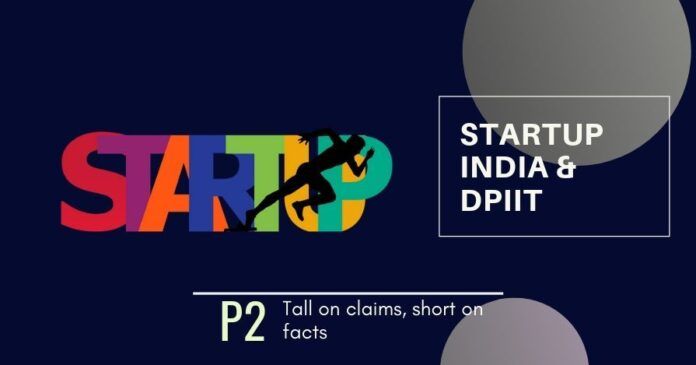
Part 1 of this series can be accessed here. This is Part 2.
The recognition process of start-ups itself seems like a major farce when you see that Department for Promotion of Industry and Internal Trade (DPIIT) is smart enough to not share any data with public about number of start-ups rejected in the recognition process, were those who registered individuals, companies or any other structures? Such data, Ramesh Abhishek Agrawal will well know, can reveal the dark picture and failure that abound his tenure.
If around 20K start-ups were registered or recognized by DPIIT, how many were rejected?
This question gains significance as there is no break-up of start-ups registered year-wise available in public domain. Is it that all those who log on to start-up India or DPIIT website get accorded a status of start-ups? If not, then who are these 20,000 recognized as start-ups? Can Abhishek at least reveal how many of these are LLP or private limited companies that have been verified by them?
Is there any list on the number of Start-ups who have actually availed or benefited against respective schemes / benefits that are being promised by DPIIT? Not even 10% of these 20K recognized start-ups have benefited.
The start-up recognition is a comedy in making mainly as it is just filling up of a form exercise that anybody can do on the start-up website supported by DPIIT. It requires some basic info like who did initial funding, what is the idea etc. And you are recognized as a start-up within 3-10 working days. But what comes next? A lot of those genuine start-ups who have tried to move forward to avail of benefits after being recognized by DPIIT have a sad tale to narrate.
Red-tape
One of the central theses of Startup India was to ensure relative ease of doing business and bring down compliance costs. In this regard, DPIIT registered Startups are allowed to self-certify compliance for 6 Labour laws and 3 Environmental laws through a simple online process. While certainly welcome, self-certification does not take away the compliance costs with regards to these laws.
For eg. a Startup will still have to comply with the Payment of Gratuity Act, 1972 and keep records of such compliance. In addition, there are several other state and central laws which require compliance which has not been addressed (Eg. The Shop and Establishment Act). Given the myriad compliance requirements in India, a Startup entrepreneur is often overwhelmed with the quantum of documentation and his/ her dealings with the authorities. This drains him of his/ her financial resources and entrepreneurial zeal.
In fact, many Startup entrepreneurs view the process of getting a DPIIT certification in itself as another complex compliance activity rather than an asset that will help them navigate through the compliance process.
The DPIIT team has been given full empowerment to ensure ease of doing business; instead, it created a system full of red-tape and complex procedures resulting in startups requiring putting significant efforts to comply with the same. Startups have effectively required to do a Ph.D. in compliance.
Funding – A panacea for Startups
No Startup can thrive without adequate funding and therefore any Startup ecosystem needs to be built around investors/ financiers willing to provide capital to Startups.
While a ‘fund of funds’ of Rs.10,000 crores to support innovation, driven Startups had been established to be managed by the Small Industries Development Bank of India (SIDBI), mere Rs.1561 crores (less than 16% in last 3 years) have been distributed to Startups.
Currently, only Category 1 Alternative Investment Funds (AIF)’s are eligible to receive funds from SIDBI[1]. Many startups have represented to DPIIT to allow SIDBI to distribute funds to Category 2 AIF which will enable faster funding to the Startup community. However, their representations so far have failed to elicit a response from DPIIT.
Why is Startup India failing?
The role of Startup India program headed by Abhishek was to liaison between various units in the startup ecosystem to help the ecosystem to function smoothly and effectively. It was the responsibility of DPIIT to ensure that:
- Startup’s concerns on Angel Tax were appropriately addressed by the relevant taxation authorities;
- If compliance burden and red tape as mentioned above on Startups is relaxed based on the feedback and representation received from various Startups; Funding ecosystem becomes robust to ensure a faster and smooth process of release of funds to all deserving Startups to ensure growth;
- All major issues and concerns of Startups were to be addressed by active intervention and action.
Instead, Abhishek has been reduced to making tall claims on employment generation which has not been backed by action on the ground. There have been allegations of favouritism while disbursing funds to select AIF’s through the SIDBI Fund of Funds. Further, there have been murmurs of favouritism to certain startups who have received tax exemption from the Inter-Ministerial Board.
Continued…
References:
[1] Using AIF regulations to start up India – Jan 22, 2017, LiveMint.com











A brilliant piece of investigative journalism! Congratulations for the painstaking research and the articles. It is not strange, however, that the person still continues to hold a govt post despite these tell tale piles of evidence against the too powerful civilian. It now appears that, notwithstanding the various claims made by those in power, only the corrupt in the bureaucracy prosper as the top has simply no chance or possibility of even knowing the real honest and competent officers. For obvious reasons that I would not like to state here. In this very context, however, it may be relevant to initiate an investigation into the manner of the functioning of the committee that grants approval for purposes of income tax benefits (100% tax deduction on donations) under section 35CCA of the Income Tax Act. I can assure you that this study would also be equally rewarding.
More such revelations are being eagerly awaited.